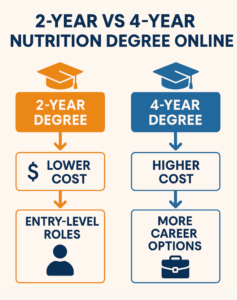If you’re interested in becoming a nutritionist, you may be wondering whether a 2-year or 4-year online degree program is the better choice. The answer depends on your goals, timeline, and budget. This guide breaks down the differences, advantages, and career paths of each route so you can confidently choose the path that works for you.
What’s the Difference Between a 2-Year and 4-Year Nutrition Degree?
A 2-year degree typically leads to an Associate of Science (AS) in Nutrition, while a 4-year degree results in a Bachelor of Science (BS) in Nutrition or Dietetics. The associate degree focuses on foundational topics in health and nutrition and prepares students for entry-level roles, while a bachelor’s program provides a deeper, more comprehensive education that may qualify graduates for more advanced roles or further certification such as the Registered Dietitian Nutritionist (RDN).
Who Should Consider a 2-Year Online Nutrition Degree?
A 2-year degree is a great choice for students who want to get into the field quickly, save on tuition, or eventually transfer to a 4-year program. These programs are also ideal for those seeking flexible, part-time study or a stepping stone to a long-term career. Many students pursuing a 2-year degree aim to work in community settings, wellness centers, or as health coaches.
To learn more, visit our detailed guide on associate degrees in nutrition.
What Can You Do With a 2-Year Nutrition Degree?
While you can’t become an RDN with just an associate degree, there are still several career paths available:
- Dietary aide in hospitals or senior living facilities
- Nutrition assistant in community health programs
- Health or wellness coach
- WIC educator
- Food service supervisor
According to the Bureau of Labor Statistics (BLS), dietetic technicians—an entry-level role achievable with an associate degree—earn a median salary of $38,170 per year as of May 2023.
What Are the Benefits of a 4-Year Online Nutrition Degree?
A 4-year bachelor’s degree in nutrition opens more doors. It allows students to pur sue clinical roles, apply for dietetic internships, and meet the educational requirements to sit for the RDN exam (when paired with a master’s degree). Bachelor’s graduates are also eligible for management and program planning roles in public health, sports nutrition, and corporate wellness.
sue clinical roles, apply for dietetic internships, and meet the educational requirements to sit for the RDN exam (when paired with a master’s degree). Bachelor’s graduates are also eligible for management and program planning roles in public health, sports nutrition, and corporate wellness.
Learn more in our guide on how to become a Registered Dietitian online.
What Careers Can You Pursue With a 4-Year Nutrition Degree?
With a bachelor’s degree, you can pursue roles such as:
- Nutritionist (in states without licensure laws)
- Corporate wellness consultant
- Community nutrition specialist
- Health educator
- Dietetic technician (NDTR)
- RDN candidate (with graduate-level education)
The BLS reports that dietitians and nutritionists earn a median salary of $69,350 per year as of May 2023. RDNs tend to earn on the higher end of that range, especially in hospitals and outpatient care centers.
How Do Tuition Costs Compare?
Tuition varies widely depending on the school, but associate degrees are generally far more affordable. For example:
- 2-Year Degree: $5,000–$15,000 total at community colleges
- 4-Year Degree: $30,000–$70,000+ total at accredited universities
However, bachelor’s degree holders typically earn higher salaries over time and have more career mobility.
Which Program Takes Less Time—and What’s the Tradeoff?
A 2-year degree can get you into the workforce sooner. But if you want to become an RDN, you’ll eventually need to complete a 4-year degree, a master’s program, and a supervised practice experience. If long-term certification is your goal, it may be more efficient to start with a bachelor’s degree.
Read more in our guide to RDN vs. Nutritionist.
Can You Transfer from a 2-Year to a 4-Year Program Later?
Yes! Many students start at a community college and transfer to a university. Look for schools that have articulation agreements to ensure your credits transfer smoothly. This path is often more affordable and flexible than enrolling in a 4-year school right away.
Accreditation and Quality: What to Look for in an Online Nutrition Program
Always choose a program that is regionally accredited and, if you’re pursuing the RDN path, ACEND-accredited. Accreditation ensures your education will be recognized for certification, licensure, and employment.
For help finding the right programs, visit our list of best online nutrition degree programs.
So… Which Path Is Right for You?
If you want to start working quickly or are exploring the field, a 2-year program might be the perfect fit. But if you’re aiming for advanced credentials, higher salaries, and long-term career growth, a 4-year degree is the stronger foundation. Consider your budget, timeline, and goals when making your decision.
FAQs
- Can I become a certified nutritionist with a 2-year degree? Not typically. Most certifications and licenses require at least a bachelor’s degree.
- Is an online nutrition degree respected? Yes—if it’s regionally accredited and meets ACEND standards (for RDN-track students).
- Can I work as a nutritionist without becoming an RDN? Yes, in many states. However, job options and scope of practice may be limited.
- Can I become a Nutritionist without a degree?
- How long does it take to become a nutritionist?








